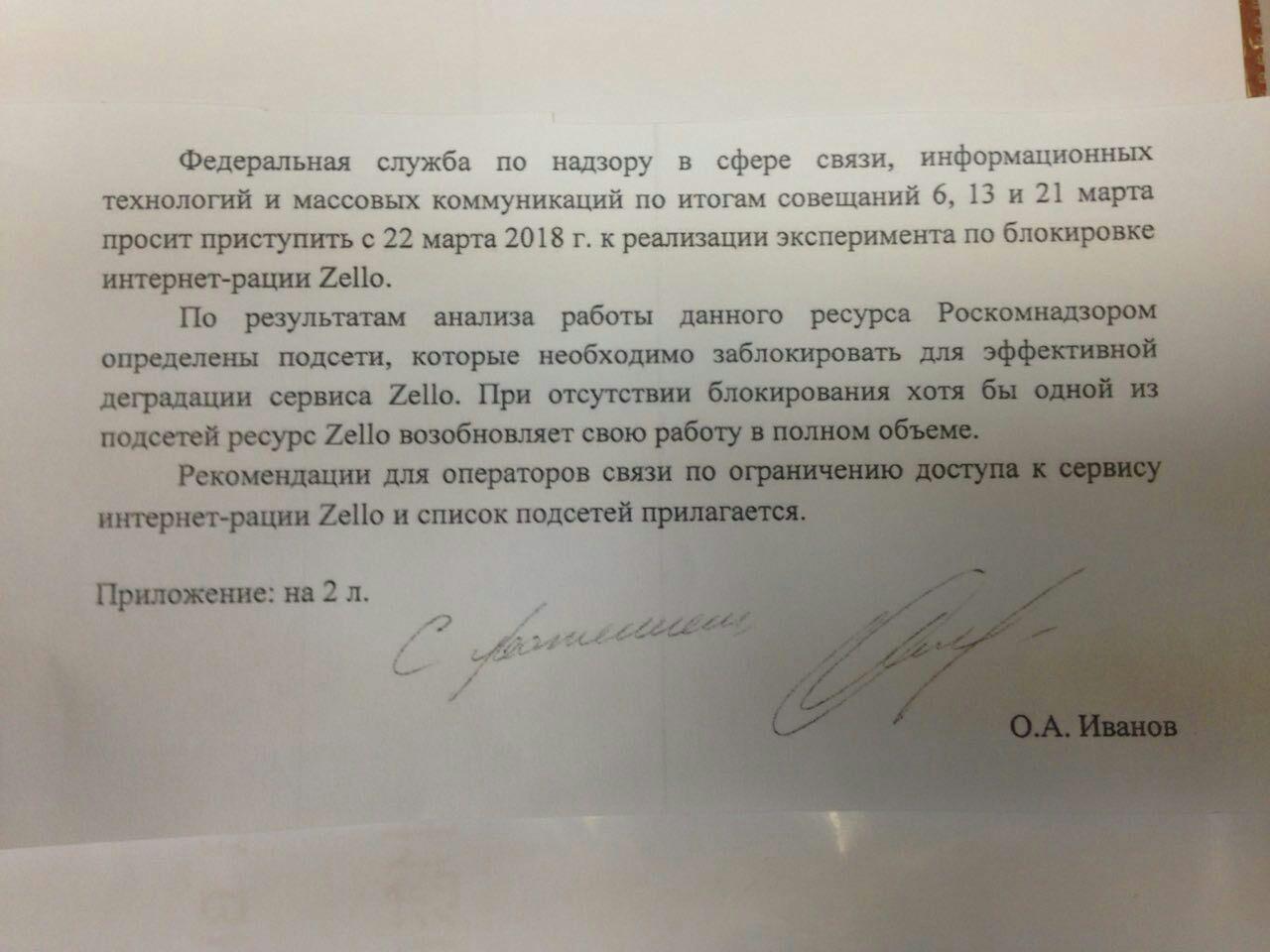Roskomnadzor will conduct an "experiment" on blocking Zello Internet radio in Russia

Source: Roskomsvoboda
A few days ago it became known that Roskomnadzor is going to attempt to block the Zello Internet radio on the territory of the Russian Federation. To begin with, the agency sent recommendations to the service providers for blocking the messenger. The corresponding information appeared at once in several Telegram-channels . In the letter of Roskomnadzor, the screenshots of which were published in Telegram, contained a list of 36 subnets that should be blocked first.
The letter also states that the blocking of Zello in Russia is an experiment for which Roskomnadzor plans to block 26 Amazon subnets. According to representatives of the department, to influence the work of the radio should block approximately 15 million IP addresses, of which 13.5 million belong to Amazon.

')
Providers are offered to perform blocking using one of the methods. These include, in particular, standard IP blocking, the introduction of ACL (Access Control List, list of access control rules) to routers to block outgoing traffic to specified networks and work with BGP dynamic routing protocol with the Black Hole method.
All this might seem like a simple “duck”, but no. Employees of three telecom operators have already confirmed to Vedomosti that they have received letters from Roskomnadzor. Other operators received the same letters. Representatives of the Big Four, however, do not confirm or deny anything.
Zell co-founder and CTO Alexei Gavrilov claims that he learned about the impending blockade from Telegram channels. Moreover, the upcoming "experiment" did not cause Gavrilov anything but surprise. The fact is that addresses from some subnets specified in the Roskomnadzor letter Zello used in the past. But the origin of several others remains a mystery to him.
Plus, even if the department succeeds in blocking subnets, this will not affect the work of Zello. But other services that do not have any relation to the Internet radio, may stop working or malfunction. Service learned to bypass the blocking back in 2014 - then they began to block it in Venezuela during the mass protests of students.
Experts say that blocking Amazon’s services in the Russian Federation will not lead to anything good. The fact is that neither the Russian nor the Chinese companies that are trying to duplicate the functions of the cloud services of the company, will not be able to cope with the volume of services of Amazon - the company works with a huge number of customers. Yes, in Russia, competing services are gradually emerging, for example, Huawei Cloud and Yandex clouds. But for Amazon, they are not yet competitors.
And blocking Amazon can entail not only purely technical problems, but also opposition from foreign organizations and departments. “It will not be possible to simply block and refer to the internal laws of the country. Not. This will include completely different countermeasures. Since Amazon is not an ordinary site, but a trading platform, the capitalization of which is inexorably approaching a trillion dollars, any such attack against it violates several international trade agreements at once, ”says lawyer and human rights activist Vladislav Yusupov.
One of the negative consequences of blocking is the impossibility of the work of popular Russian sites, even those who are actually located on the territory of the Russian Federation, but using Amazon services. AWS servers host Airbnb, Twitter, Dropbox, which are extremely popular in Russia.
Amazon is trying to provide customers with a flexible and automated system for issuing resources that may be needed by a variety of projects. If resources are no longer needed, but they fall into a common pool that is accessible to all customers. And if you block some addresses from the common pool, the services that take advantage of such resources will suffer. True, they will have problems only in Russia.
Olga Makarova, MTS representative, believes that the Roskomnadzor initiative does not have clear limits of responsibility. In other words, if companies in Russia start losing money due to the inoperability of Amazon services in the territory of the Russian Federation, it is unclear who will be responsible for the problems and whether they will be responsible at all.
Worst of all, it is not yet clear whether something will actually be blocked or whether Roskomnadzor has abandoned its initiative.
Source: https://habr.com/ru/post/357864/
All Articles